2017年秋【人教版】高中英语必修五全册精品学案
- 格式:pdf
- 大小:600.24 KB
- 文档页数:62
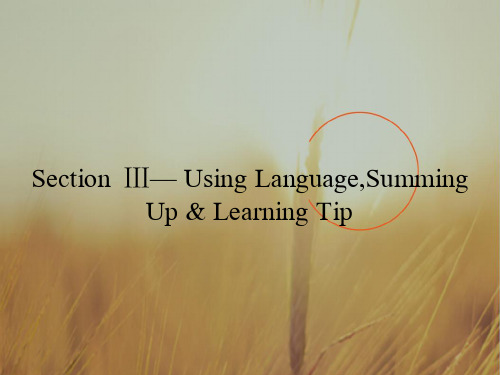
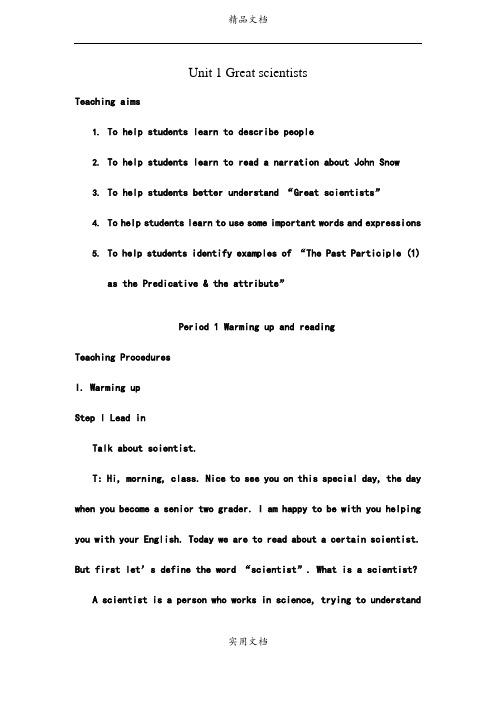
Unit 1 Great scientistsTeaching aims1.To help students learn to describe people2.To help students learn to read a narration about John Snow3.To help students better understand “Great scientists”4.To help students learn to use some important words and expressions5.To help students identify examples of “The Past Participle (1)as the Predicative & the attribute”Period 1 Warming up and readingTeaching ProceduresI. Warming upStep I Lead inTalk about scientist.T: Hi, morning, class. Nice to see you on this special day, the day when you become a senior two grader. I am happy to be with you helping you with your English. Today we are to read about a certain scientist. But first let’s define the word “scientist”. What is a scientist?A scientist is a person who works in science, trying to understandhow the universe or other things work.Scientists can work in different areas of science. Here are some examples: Those that study physics are physicists. Those that study chemistry are chemists. Those that study biology are biologists.Step IIAsk the students to try the quiz and find out who knows the most.T: There are some great scientific achievements that have changed the world. Can you name some of them? What kind of role do they play in the field of science? Do these achievements have anything in common? Match the inventions with their inventors below before you answer all these questions.1. Archimedes, Ancient Greek (287-212 BC), a mathematician.2. Charles Darwin, Britain (1808-1882). The name of the book is Origin of Species.3. Thomas Newcomen, British (1663-1729), an inventor of steam engine.4. Gregor Mendel, Czech, a botanist and geneticist.5. Marie Curie, Polish and French, a chemist and physicist.6. Thomas Edison, American, an inventor.7. Leonardo da Vinci, Italian, an artist.8. Sir Humphry Davy, British, an inventor and chemist.9. Zhang Heng, ancient China, an inventor.10. Stepper Hawking, British, a physicist.II. Pre-readingStep IGet the students to discuss the questions on page 1 with their partners. Then ask the students to report their work. Encourage the students to express their different opinions.1.What do you know about infectious diseases?Infectious diseases can be spread to other people. They have an unknown cause and need public health care to solve them. People may be exposed to infectious disease, so may animals, such as bird flu,AIDS, SARS are infectious diseases. Infectious diseases are difficult to cure.2.What do you know about cholera?Cholera is the illness caused by a bacterium called Vibrio cholerae. It infects people’s intestines(肠), causing diarrhea and leg cramps (抽筋).The most common cause of cholera is by someone eating food or drinking water that has been contaminated(污染) with the bacteria. Cholera can be mild(不严重的) or even without immediate symptoms(症状), but a severe case can lead to death without immediately treatment.3. Do you know how to prove a new idea in scientific research?Anybody might come out with a new idea. But how do we prove it in scientific research? There are seven stages in examining a new idea in scientific research. And they can be put in the following order. What order would you put the seven in? Just guess.Find a problem→Make up a question→Think of a method→Collect results→Analyse the results→ Draw a conclusion→ Repeat if necessaryIII. ReadingStep I Pre-reading1.Do you know John Snow?John Snow is a well-known doctor in the 19th century in London and he defeated “King Cholera”.2.Do you know what kind of disease is cholera?It is a kind of terrible disease caused by drinking dirty water and it caused a lot of deaths in the old times and it was very difficult to defeat.Let’s get to know how Dr. John Snow defeated “King Cholera” in 1854 in London in this reading passage:Step II SkimmingRead the passage and answer the questions.1.Who defeats “King Cholera“? (John Snow)2.What happened in 1854? (Cholera outbreak hit London.)3.How many people died in 10 days? (500)4.Why is there no death at No. 20 and 21 Broad Street as well as atNo. 8 and 9 Cambridge Street?(These families had not drunk the water from the Broad Street pump.) (Optional)Skim the passage and find the information to complete the form below.Step III ScanningRead the passage and number these events in the order that they happened.2 John Snow began to test two theories.1 An outbreak of cholera hit London in 1854.4 John Snow marked the deaths on a map.7 He announced that the water carried the disease.3 John Snow investigated two streets where the outbreak was verysevere.8 King Cholera was defeated.5 He found that most of the deaths were near a water pump.6 He had the handle removed from the water pump.Step IV Main idea and correct stageRead the passage and put the correct stages into the reading about research into a disease.Step V Group discussionAnswer the questions (Finish exercise 2 on Page 3)1. John Snow believed Idea 2 was right. How did he finally prove it?(John Snow finally proved his idea because he found an outbreak that was clearly related to cholera, collected information and was able to tie cases outside the area to the polluted water.)2. Do you think John Snow would have solved this problem without the map?(No. The map helped John Snow organize his ideas. He was able to identify those households that had had many deaths and check their water-drinking habits. He identified those houses that had had no deaths and surveyed their drinking habits. The evidence clearly pointed to the polluted water being the cause.)3. Cholera is a 19th century disease. What disease do you think is similar to cholera today?(Two diseases, which are similar today, are SARS and AIDS because they are both serious, have an unknown cause and need public health care to solve them.Step VI Using the stages for scientific research and write a summary.Period 2&3 Language focusStep I Warming up1.characteristic① n. a quality or feature of sth. or someone that is typical of themand easy to recongnize.特征;特性What characteristics distinguish the Americans from the Canadians.② a. very typical of a particular thing or of someone’s characer 典型性的,Such bluntness is characteristic of him.Windy days are characteristic of March.[辨析]characteristic与charactercharacteristic是可数名词,意为“与众不同的特征“character表示(个人、集体、民族特有的)“性格、品质”,还意为“人物;文字”What you know abou t him isn’t his real character.2. put forward: to state an idea or opinion, or to suggest a plan or person, for other people toconsider提出He put forward a new theory.The foreigners have put forward a proposal for a joint venture.An interesting suggestion for measuring the atmosphere around Mars has been put forward.☆ put on穿上;戴上;增加put out熄灭(灯);扑灭 (火) put upwith…忍受put down写下来;放下;put off 耽误; 延期put up建立; 建造,put up举起,搭建,粘贴3. analyze: to examine or think about something carefully in order to understand it vt.分析结果、检讨、细察A computer analyses the photographs sent by the satellite.The earthquake expert tried to analyze the cause of the earthquake occurred on May 12,2008.Let’s analyze the problem and see what went wrong.He analyzed the food and found that it contained poison.We must try to analyze the causes of the strike.☆ analysis n.分析,解析,分解4. conclude: decide that sth. is true after considering al the information you have 得出结论;推论出to end sth. such as a meeting or speech by doing or saying one final thing vt. & vi结束,终止;We concluded the meeting at 8 o’clock with a prayer.From his appearance we may safely conclude that he is a heavy smoker.What do you conclude from these facts?We conclude to go out / that we would go out.conclusion n.结论arrive at a conclusion; come to a conclusion; draw a conclusion; reach a conclusionWhat conclusion did you come to / reach / draw / arrive at?From these facts we can draw some conclusions about how the pyramids were built.Step 2 Reading1. defeat① vt. to win a victory over someone in a war, competition, game etc.打败,战胜,使受挫I’ve tried to solve the problem, but it defeats me!Our team defeated theirs in the game.② n.失败,输 failure to win or succeedThis means admitting defeat.They have got six victories and two defeats.[辨析]win, beat与defeat① win “赢得”赛事、战事、某物;后接人时,意为“争取赢得…的好感或支持;说服”② beat “战胜”“击败”比赛中的对手,可与defeat互换We beat / defeated their team by 10 scores.They won the battle but lost many men.The local ball team won the state championship by beating / defeating all the other teams.I can easily beat /defeat him at golf.He is training hard to win the race and realize his dream of becominga champion at the 2008 Olympic Games.2. expert①n. someone who has a special skill or special knowledge of a subject专家,能手an expert in psychology an agricultural expert② a.having special skill or special knowledge of a subject 熟练的,有专门技术的an expert rider an expert job需专门知识的工作He is expert in / at cooking.3. attend vt. &vi 参加,注意,照料① be pres ent at参加attend a ceremony / lecture / a movie / school / class / a meetingI shall be attending the meeting.Please let me know if you are unable to attend the conference.② attend to (on): to look after, care for, serve伺候, 照顾,看护The queen had a good doctor attending on her.Dr Smith attended her in hospital. 治疗Are you being attended to?接待Mother had to attend to her sick son.③ attend to处理,注意倾听attend to the matterA nurse attends to his needs.Can you attend to the matter immediately?I may be late – I have got one or two things to attend to. Excuse me, but I have an urgent matter to attend to.[辨析]attend, join, join in与take part in①attend指参加会议、上课、上学、听报告等②join 指加入某组织、团体,成为其中一员③join in指加入某种活动;表示与某人一起做某事join sb. in sth.④take part in指参加正式的、有组织的活动,切在活动中起积极作用Only 2 people attended the meeting.He joined the Communist Youth League in 2007.Will you join us in the game?We often tale part in the after-class activities.4. expose : to show sth. that is usually covered暴露expose sth. to the light of day 把某事暴露于光天化日之下I threatened to expose him ( to the police). 我威胁要(向警察)揭发他. He exposed his skin to the sun.他把皮肤暴露在阳光下.The old man was left exposed to wind and rain.When he smiled he exposed a set of perfect white teeth.5. cure vt. & n. to make someone who is ill well agian治疗,痊愈When I left the hospital I was completely cured.①cure sb of a diseaseWhen you have a pain in your shoulders, you will go to see a doctor.The doctor will cure you.The only way to cure backache is to rest.He will cure the pain in your shouldersWhen I left the hospital I was completely cured.The illness cannot be cured easily.Although the boy was beyond cure, his parents tried to cure him of bad habits.②a cure for a diseaseAspirin is said to be a wonderful cure for the pain.There is still no cure for the common cold.Is there a certain cure for cancer yet?③a cure for sth.: to remove a problem, or improve a bad situation 解决问题,改善困境The prices are going up every day, but there is no cure for rising prices.[辨析]cure与treat①cure主要指痊愈,强调的是结果②treat强调治疗过程,指通过药物、特别的食品或运动治疗病人或疾病,不强调结果。
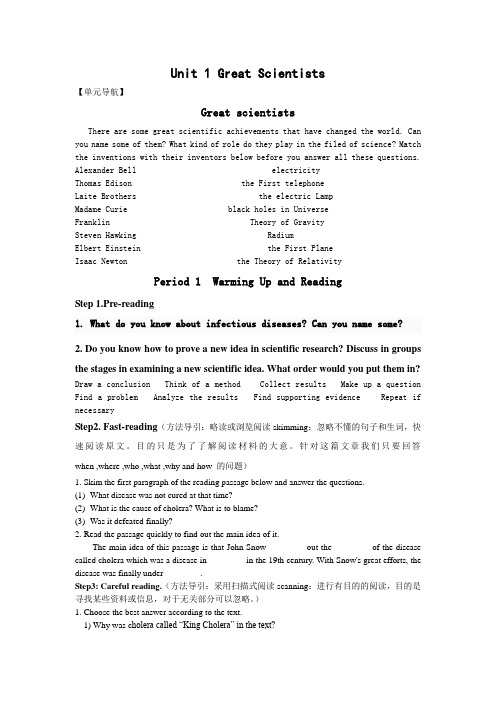
Unit 1 Great Scientists【单元导航】Great scientistsThere are some great scientific achievements that have changed the world. Canyou name some of them? What kind of role do they play in the filed of science? Matchthe inventions with their inventors below before you answer all these questions.Alexander Bell electricityThomas Edison the First telephoneLaite Brothers the electric LampMadame Curie black holes in UniverseFranklin Theory of GravitySteven Hawking Radium Elbert Einstein the First PlaneIsaac Newton the Theory of RelativityPeriod 1 Warming Up and ReadingStep 1.Pre-reading1. What do you know about infectious diseases? Can you name some?2. Do you know how to prove a new idea in scientific research? Discuss in groupsthe stages in examining a new scientific idea. What order would you put them in?Draw a conclusion Think of a method Collect results Make up a questionFind a problem Analyze the results Find supporting evidence Repeat ifnecessaryStep2. Fast-reading(方法导引:略读或浏览阅读skimming:忽略不懂的句子和生词,快速阅读原文。
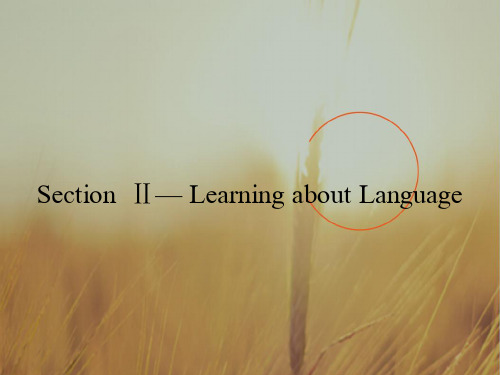
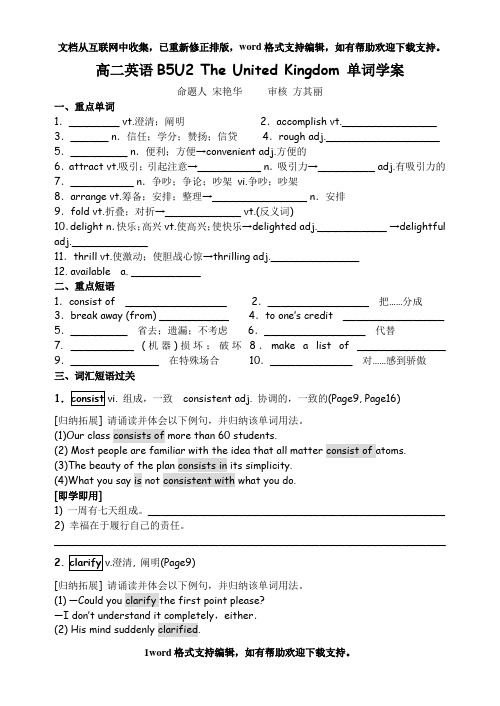
高二英语B5U2 The United Kingdom 单词学案命题人宋艳华审核方其丽一、重点单词1.________ vt.澄清;阐明2.accomplish vt._______________ 3.______ n.信任;学分;赞扬;信贷4.rough adj.__________________ 5._________ n.便利;方便→convenient adj.方便的6.attract vt.吸引;引起注意→__________ n.吸引力→_________ adj.有吸引力的7.__________ n.争吵;争论;吵架vi.争吵;吵架8.arrange vt.筹备;安排;整理→_______________ n.安排9.fold vt.折叠;对折→____________ vt.(反义词)10.delight n.快乐;高兴vt.使高兴;使快乐→delighted adj.___________ →delightful adj.____________11.thrill vt.使激动;使胆战心惊→thrilling adj.______________12. available a. ___________二、重点短语1.consist of________________ 2.________________ 把……分成3.break away (from) ___________ 4.to one’s credit ________________ 5._________ 省去;遗漏;不考虑6.________________ 代替7. __________ (机器)损坏;破坏8.make a list of ______________ 9.______________ 在特殊场合10._____________ 对……感到骄傲三、词汇短语过关1组成,一致consistent adj. 协调的,一致的(Page9, Page16)[归纳拓展] 请诵读并体会以下例句,并归纳该单词用法。
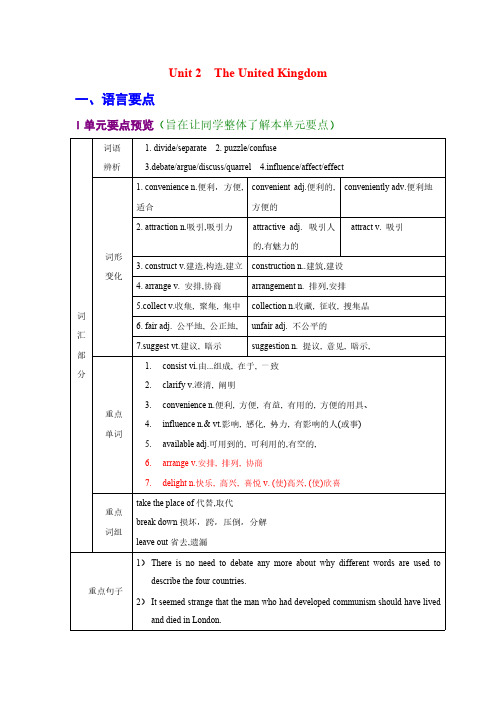
Unit 2 The United Kingdom 一、语言要点I单元要点预览(旨在让同学整体了解本单元要点)词语辨析1. divide/separate2. puzzle/confuse3.debate/argue/discuss/quarrel4.influence/affect/effect1. convenience n.便利,方便,适合convenient adj.便利的,方便的conveniently adv.便利地2. attraction n.吸引,吸引力attractive adj. 吸引人的,有魅力的attract v. 吸引3. construct v.建造,构造,建立construction n..建筑,建设4. arrange v. 安排,协商arrangement n. 排列,安排5.collect v.收集, 聚集, 集中collection n.收藏, 征收, 搜集品6. fair adj. 公平地, 公正地,unfair adj. 不公平的词形变化7.suggest vt.建议, 暗示suggestion n. 提议, 意见, 暗示,重点单词1.consist vi.由...组成, 在于, 一致2.clarify v.澄清, 阐明3.convenience n.便利, 方便, 有益, 有用的, 方便的用具、4.influence n.& vt.影响, 感化, 势力, 有影响的人(或事)5.available adj.可用到的, 可利用的,有空的,6.arrange v.安排, 排列, 协商7.delight n.快乐, 高兴, 喜悦v. (使)高兴, (使)欣喜词汇部分重点词组take the place of代替,取代break down损坏,跨,压倒,分解leave out省去,遗漏重点句子1)There is no need to debate any more about why different words are used to describe the four countries.2)It seemed strange that the man who had developed communism should have lived and died in London.重点语法过去分词做宾语补足语II 词语辨析(旨在提供完形填空所需材料)1). divide/separate v.【解释】divide “把一个整体分成若干部分”,破坏了宾语的完整性,常与“into”连用separate 指”把原来连在一起或靠近的部分分割开来”,常与“from” 连用【练习】选择divide或separate并用其适当的形式填空1)The apple was _________ into two.2)His lecture ___________divides into three parts.3)She was __________separated from her husband last year.4)The Taiwan Strait __________ Taiwan from FujianKeys: 1)divided 2)divides 3)separated 4)separates2). puzzle/confuse【解释】puzzle 指“情况错宗复杂, 因而使人感到困惑不解”confuse 指“把事物混淆或弄乱“或“由于混淆、混乱而糊涂”, 语气较弱, 常指暂时现象【练习】选择puzzle 或confuse并用其适当的形式填空1)What he did __________puzzled me greatly.2)They asked me so many questions that they _________confused me.3)I am always ________ salt with sugar.4)The patient’s illness _______ the doctor; and he couldn’t find the cause.Keys: 1)puzzled 2)confused 3)confusing 4)puzzled3) debate/argue/discuss/quarrel辩论,争论【解释】debate就已经确定或统一的问题,各述己见,公开,正式的争论.含交锋的意思argue 指提出理由或事实,试图在争辩中说服对方,或促使他人拥护自己倡导的理由或观点:discuss指一般讨论,谈论quarrel常指因琐事而感到气愤,进行争吵【练习】选择debate/argue/discuss/quarrel或puzzle并用其适当的形式填空1)The couple are always __________quarreling about the past.2)Have you _________ the problem with anyone?3)I _________ with her all day about the situation.Keys: 1)quarreling 2)discussed 3)argued4) influence/affect【解释】Affect着重影响一个人的感情或健康,也指事物受到影响influence影响,指对人或事物起某种作用,使其行为,性格或观点等发生变化,常含有潜移默化的意味.【练习】选择influence或affect并用其适当的形式填空1) The noise from the street _________affected my study.2) Outside factors _____________influenced him to resign.3) My parents _________ my childhood a great deal.Keys: 1) affected 2) influenced 3) influencedIII 词性变化(旨在提供语法填空所需材料)1. convenience n.便利,方便,适合convenient adj.便利的,方便的conveniently adv.便利地2. attraction n.吸引,吸引力attractive adj. 吸引人的,有魅力的attract v. 吸引3. construct v.建造,构造,建立construction n..建筑,建设4. arrange v. 安排,协商arrangement n. 排列,安排5.collect v.收集, 聚集, 集中collection n.收藏, 征收, 搜集品6. fair adj. 公平地, 公正地,unfair adj. 不公平的7.suggest vt.建议, 暗示suggestion n. 提议, 意见, 暗示,【练习】用括号内所提供词的适当形式填空1) These meals are quick and _________ to prepare. We provide these meals for the _____ of the customers. (convenience)2)What ________ me first was that there is a beautiful house with an ____________ garden.(attraction)3)They had an _________ that the children would spend their holiday abroad.(arrange)4)The classic music _________ his childhood, and he thought that listening to the music has a calming_________ on him. (influence)5) A new city of Wenchuan is still under __________, although it was ________ a half yearago.(construct)6)At the whole classmates’________, the head teacher ________ they should go camping this weekend.(suggest)keys: 1) convenient; convenience 2) attracted; attractive 3) arrangement 4) influenced; influence 5) construction; constructed 6) suggestion; suggestedIV 重点词汇(旨在提供综合运用所需材料)1 consist vi.由...组成, 在于, 一致consist of=be made up of 由…组成;由…构成[典例]1)Substances consist of small particles called molecules. 物质是由叫做分子的微粒组成的。
高二年级教学案 高中英语第五册 第一单元 1. conclude: 翻译下面句子并总结conclude的词义及用法: 1) The report concluded (that) the accident had been caused by human error. He concluded from their remarks that they didn’t support the plan. It was concluded that he should be to blame for the accident. conclude 词性: ____________ 含义:_____________________________ 用法:(1) ______________________________________________________ (2) ______________________________________________________ (3) ______________________________________________________ 2) He published his results after he concluded his research. The conference usually concludes with an informal discussion. He concluded by wishing everyone a safe trip home. conclude词性: ____________ 含义: _____________________ 用法:(1) _________________________ 含义:_____________________________ (2) _________________________ 含义:_____________________________ (3) _________________________ 含义:_____________________________ 翻译:晚会以一首著名的歌曲结束。 _______________________________________________________________. 3) conclusion 词性: ______ 含义:____________ 相关词组:draw a conclusion 含义:_____________________________ jump to conclusions含义:_____________________________ in conclusion 含义:_____________________________
2017年秋【人教版】高中英语必修五全册精品学案Book 5 Unit 1 Great ScientistsPeriod 1 Reading学习目标1. 通过学习John Snow战胜霍乱的故事,学习其科学态度并了解霍乱的相关知识。
2. 通过阅读训练提高分析文章的能力,掌握抓文章细节的能力。
3. 根据课文缩写,复述John Snow战胜霍乱的故事。
自主合作探究【探究1】Ⅰ.Read the text quickly and fill in the blanks. (No more than 3 words)Paragraph Stages General ideas1 Find a problem. The 1.________of cholera.2 2._________________ The correct or possible theories.3 Think of a method. 3.___________data on where people were dead and ill and where they got their water.4 4.__________________ Plot information on a map to find out where people 5._________or didn't die.5 Analyse the results. 6.________the water to see if that is the cause of the illness.6 7.__________________. Find other evidence to confirm his 8.___________.7 Make a conclusion. The 9.________water was to 10.__________for the cause of the London cholera.【探究2】Ⅱ.Read the text again and choose the best answer.1.What does the passage mainly talk about?A.John Snow was a famous doctor in London.B.The reason that caused the deadly disease cholera.C.John Snow solved the problem of cholera.2.Which of the following theories did John Snow believe in?A.A cloud of dangerous gas would float around until it found its victims.B.People absorbed cholera into their bodies with their meals.C.People got infected with cholera because of cold and hunger.3.Before 1854,when cholera broke out,________.A.many thousands of people died B.people with cholera could be cured C.John Snow began to know its cause4.How did he find out the cause of the disease?A.By living in the area where cholera broke out.B.By marking a map where all the dead people had lived.C.By telling the terrified people how to prevent it.5.What do you think the Londoners would do with the unused pumps after defeating “King ?A.They would destroy them.Cholera”B.They would reuse them after cleaning. C.They would desert them for ever.【探究3】III. Recite the following sentences1.John Snow was a famous doctor in London-so expert,indeed,that he attended Queen Victoria as her personal physician.约翰·斯诺是伦敦一位著名的医生—他的确医术精湛,因而成了维多利亚女王的私人大夫。
2.Neither its cause nor its cure was understood.人们既不知道它的病源,也不知道它的治疗方法。
3.So many thousands of terrified people died every_time there was an outbreak.每次爆发霍乱时就有成千上万惊恐的人病死。
4.A woman,who had moved away from Broad Street,liked the water from the pump so much that she had_it_delivered to her house every day.有一位妇女是从宽街搬来的,她特别喜欢那里的水,每天都要派人从水泵打水运到家里来。
达标练习Ⅰ. Fill in the blanks according to the text.John Snow was a well-known doctor in London. Cholera was the most deadly disease of its day. Neither its cause nor its 1.________was understood. So many thousands of terrified peopledied every time there was an 2.________.At that time,there were two theories explaining how cholera killed people. John Snow 3.________ in the second one. As the disease 4.________quickly through the poor neighbourhoods,he began to 5.________the information.He 6.________on a map where all the dead people had lived. The map gave a valuable clue about the cause of the disease. That was,the water from Broad Street pump seemed to be to 7.________.Furthermore,he found the water came from the 8.________river from London. With another two cases,John Snow 9.________with certainty that polluted water carried the diseasewas and suggested that the source of all water supplies be examined. Finally “King C holera” 10.________.Ⅱ.短语填空put forward link...to... suspect...of draw a conclusionbe to blame be absorbed in cure …of expose...to1.We had no desire to________________our plan.2.We must_____________this shameful activity_____________the newspaper.3.The students sat in the classroom and ____________reading English.4.We consider that you ________________for the accident.5.They ______________________from the fact at last.6.People often ______________lung cancer ________________smoking.7. To our great joy, the doctor ________ him _______ his serious disease.Book 5 Unit 1 Great ScientistsPeriod 2 Language Study(I)编者:王海虹修编:李慧学习目标1.熟练掌握下列词汇和短语的用法。
2. 能用所学的语言点造句并用于写作中。
自主合作探究1.put forward提出;将……提前;把……向前拨;推荐【品味经典】1) Who put forward a theory about black holes? (教材P1)谁提出了关于黑洞的理论?2) We've put the wedding forward by one week. 我们已把婚礼提前了一周。
【归纳拓展】put aside搁在一边(不去理会);储存put away收拾好;储存put off延期put out扑灭;使熄灭;生产put on穿上;上演;打开put through使经受;接通(电话)put up举起;建立;张贴put down写下;记下;放下【语境活用】根据句意完成下列句子①I __________ (推迟)the interview after Christmas.②We ________ the play ________ again next week owing to its success.③If you have finished with those tools,I wish you'd ______________.(把他们放好)④He _____________ his work to spend more time with his son.2.conclusion n.[C.U]结论,结束①draw/reach/come to/arrive at a/the conclusion 得出结论;in conclusion总之;总而言之②conclude vt.& vi.结束;推断出conclude (sth.)with sth ./by doing sth.以……结束conclude...from...从……中推断出…… 【品味经典】1) I soon came to the conclusion that he was lying. 不久,我断定他在撒谎。